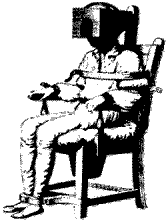Sunday, November 26, 2006
Wilhelm Wundt
Wundt's new "science" in describing Man as an animal that could be manipulated as easily as a dog could be trained to salivate at the sound of a bell, found great favor with governments. His theories fueled the ambitions of Germany's "Iron Chancellor", Otto Von Bismarck, who sought control of the masses to feed his war machine.
Although the "man is an animal" theory is easily disproved - dogs do not drive cars, horses will never paint masterpieces and concertos have yet to be performed by an orchestra of monkeys - psychology and psychiatry adopted Wundt's theory as truth.
Man was declared "victim" of his environment and was said to have little conscious control of his own thoughts and actions. However, psychology and psychiatry have yet to scientifically isolate one biological cause of unwanted behavior, or offer a workable cure.
As a closing statement for today's blog, here is a quote from Wilhelm Wundt in 1911:
"The soul can no longer exist in the face of our present-day physiological knowledge."
Friday, November 24, 2006
Origins of the words Psychology and Psychiatry
As long as man's problems were those of the soul, it was the domain of the clergy and religion to to address those problems.
Later, in 1808 the word "psychiatry" was coined by Johann Christian Reil. This word means "doctoring the soul", coming from psyche (soul) and iatros (doctor). This new word allowed psychiatrists to take matters of the soul away from religion and into their own, incapable hands.
Thursday, November 09, 2006
"The Father of American Psychiatry"
Dr. Benjamin Rush - also known as the "Father of American Psychiatry" was alive from 1745-1813. Just before he passed away - in 1812 - he published the first American textbook on psychiatry.
In this book, masturbation and too much blood to the brain were considered causes of madness. Treatment involved cauterizing the spine and genitals or encasing the patient's private parts in plaster to prevent masturbation. (Oddly enough, in present time masturbation is considered and needful activity which prevents madness.)
Rush's recommended treatment included:
- Dropping "patients" into a well, on the basis that "if the patient nearly drowned and then brought back to life, he would take a fresh start, leaving his disease."
- Blistering the ankles to draw blood away from the "overheated head."
- Bleeding as much as "four-fifths of the blood in the body" to relieve the "excessive action" in the patient's brain.
None of his ideas about the brain being the cause of insanity has ever been medically proven, and psychiatrists still forward this fallacy today to market their mind-altering drugs.
To end this segment about American Psychiatry's "Father", here as a quote from him about his invention - the "Tranquilzer Chair" pictured about two posts below this one:
"It binds and confines every part of the body. By preventing the muscles from acting...the position of the head and feet favors the easy application of cold water to the former and warm water to the latter. Its effects have been truly delightful to me."
Saturday, November 04, 2006
Johann Christian Reil, 1800-1808
Wednesday, November 01, 2006
1700s-1800s
Throughout the 1700s and 1800s, patients were chained naked to walls, beaten with rods and lashed into obedience. French asylum director Philippe Pinel abolished the use of chains in Paris' Salpetriere Institution in 1793. In their place he instituted straitjackets and threatened patients who misbehaved with "10 severe lashes".
I can't say that there were any huge advances or changes made in psychiatry during this time, it was pretty much the same torturous treatment as in the 1600s-1700s. None of the above is not nearly as awful as what the "Father of American Psychiatry" Benjamin Rush did to his patients. I'll share that with you next time, but just to leave you with an idea of his attitude, here's a quote from Dr. Benjamin Rush regarding one of his inventions - the "Tranquilizer Chair", which was used to keep the patient in a state of discomfort and pain for hours on end:
"It binds and confines every part of the body. By preventing the muscles from acting...the position of the head and feet favors the easy application of cold water or ice to the former and warm water to the latter. Its effects have been truly delightful to me."
Here's a pic of the chair:


